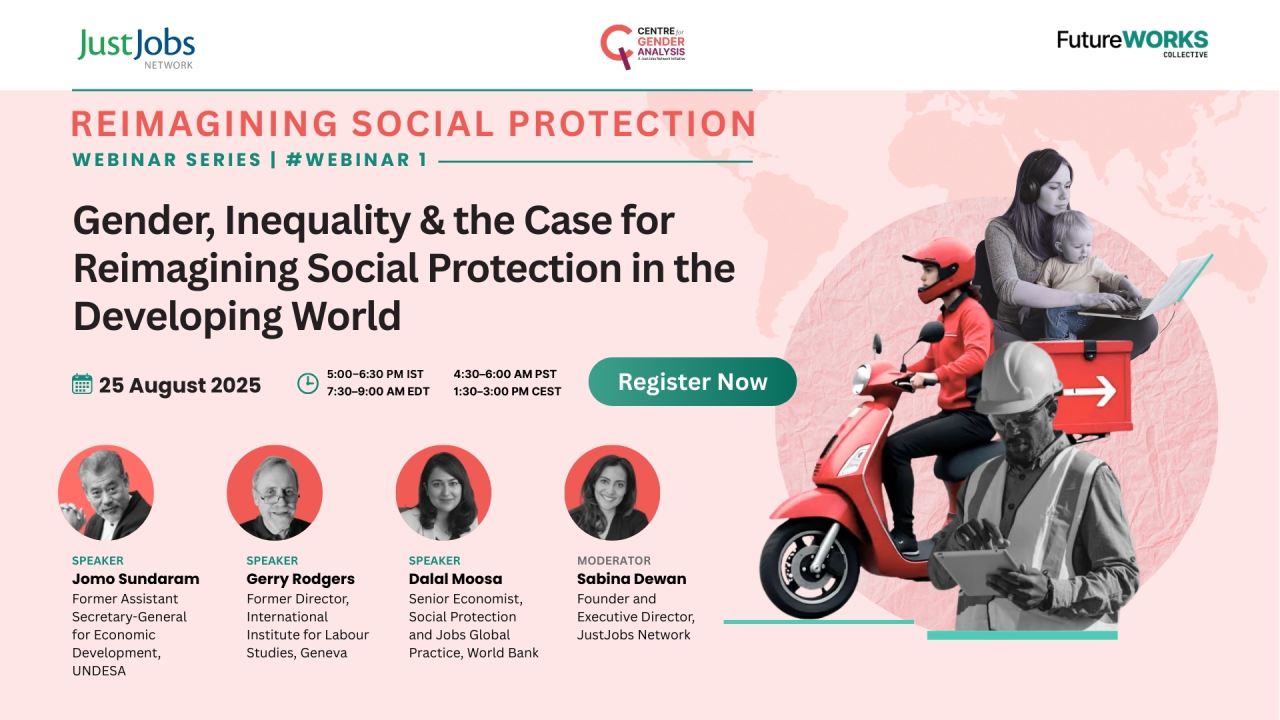When considering the strategies for India’s economic rebound, it is imprudent to overlook the potential of the wider digital economy, as this all-pervasive technology has altered urban landscapes and living in the last decade in the country. An explosive combination of cheap handsets, lowest data costs in the world and rapid advances in vernacular language processing, has led us to this moment. Therefore, a platform economy of service providers and users can prove to be a robust vehicle for post-pandemic growth. Platform sectors span mobility, logistics, home improvement, beauty & wellness and many others, and the workers deriving their livelihoods from these jobs stand to gain from the safety and hygiene measures put in place to transition to an economy opening up.
Mahalakshmi is a Bangalore citizen in her mid-thirties. Her greatest joys are her ability to support herself in life and driving. She is a partner with a ride-hailing aggregator service in India, and regularly takes up trips in her self-owned sedan during the night – at least, till the pandemic hit and lockdowns and other restrictions were put in place. Through her children, whom she has enrolled in ICSE schools (Indian Certificate of Secondary Education; a school syllabus regarded as more competitive, elite and expensive by India’s mean income standards) to attain world-class education, she vicariously lives her unfulfilled academic dreams that ended in high school. Mahalakshmi represents many platform-entrepreneurs, especially women workers, whose lives have been transformed by the digital revolution and advent of the platform economy in India.
Women like Mahalakshmi still are a rarity in the mobility platform economy of India, despite best efforts directed at increasing representation of women in unconventional jobs like driving or delivery work. In the Indian society, conservative dictums situate women’s “proper” place in the domestic sphere, let alone in service jobs like driving which have traditionally been men’s forte. But it is important for women to be ridesharing service providers, from not just the perspective of their economic mobility; it also makes streets safer, mobility more accessible to women, and brings gender parity to public spaces that are otherwise dominated by men.
Mahalakshmi, who especially enjoys the longer trips outside her regular city beat, is one of an even rarer group, but signals a shift of gears. There is an active effort by digital mobility platforms tailored towards skilling women in such jobs, mediating their financial access to improve their chances at micro-entrepreneurship through the platform economy, and in acknowledging that structural changes – such as hygienic public restrooms and gender-sensitised traffic police, toll booth operators, male drivers, etc. – are needed. By increasing women’s public participation in this sector, social change is expected to follow.
Apart from the mobility economy, women platform entrepreneurs are found in the services of home-based spa and salon service providers. Women in India are regarded as primary caregivers of their families, and the conventional job market also prioritises women providers for services such as healthcare, primary education, childcare, geriatric care, or beauty work. Replicating such historic trends in care work, but with greater pay, perks and flexibility than available in any other type of jobs, women have found lucrative opportunities in the at-home services platform, and stand to gain the most when the economy reopens post-COVID: Platforms are prioritising partner vaccinations, compliance with COVID-Appropriate Behaviour (CAB) and ensuring safety and hygiene for all actors.
Image credit: Jorge Royan / Wikimedia
The Ola Mobility Institute (OMI) has undertaken extensive research on the Indian digital platform economy and documented trends across urban services sectors that are now online; primarily, the digital economy of services is found in mobility, e-commerce & logistics, on-demand food delivery and at-home services, including home maintenance and salon services. Platform companies focus on matching skilled professionals with urban consumers in need of their services, and essentially act as digital intermediaries or online marketplaces. OMI studies the Future of Work from the prism of platform partners as micro-entrepreneurs, while fully accounting for nuances in a market like India where the conventional economy has a high number of self-employed workers and an even higher proportion of wage workers. These trends are replicated within platform relationships, and makes for a comparative study between work in and outside of the platform economy.
In the report, “Unlocking Jobs in the Platform Economy: Propelling India’s post-Covid Recovery”, OMI has collected primary data and presents the trends in the mobility platform economy in mid-2019; it shows how pre-pandemic, workers associated with platforms consistently supported more dependents than those outside of it, earned a higher income based on hours inputted, accessed finance and bought assets for the sharing economy, all different from the trends spotted in the traditional economy. Since the beginning of the pandemic and the resultant economic shutdown, platform workers have accessed more immediate relief, welfare nets and found work in emergency response operations coordinated by platform companies, thus securing incomes in albeit small ways.
A platform-led recovery from the economic effects of COVID-19 cases surging in 2021 can be realised: combined with meaningful reform, platform work can be made more secure, remunerative and an effective form of micro-entrepreneurship. Self-employment has long been the mainstay of the Indian labour market: the challenge is to prevent it turning exploitative. The study from OMI reveals that self-employment and asset ownership have important roles to play in buoying incomes in and outside the platform economy, and this can be achieved through reforms in the financial sector and lending practices. Driver-partners such as Mahalakshmi also benefit from being asset owners, i.e., owners of the means of their work, such as a vehicle, in the case of the mobility economy, and therefore are able to attain socio-economic mobility rapidly, through the platform economy.
Much of the debate around regulating work hinges on ‘on-the-job-benefits’. Therefore, to achieve universalised social security, well-funded state-led social safety schemes such as family healthcare and small savings for dignified retirement, and beneficiary qualification independent of worker status has to be normalised. This would require the recognition that equitable schemes can be designed only based on:
– recognising the variety of platform work
– augmenting social security financing through innovative means (like multi-source funding including civil society contributions)
– institutionalising scientific methods to design these schemes
– supporting workers and ensuring benefits reach them,
– and welfare-state governments like India can lead the charge in effective labour reform.
This is the spirit of the recommendations in the “RAISE framework” captured in OMI’s report on ways to achieve lucrative and secure platform jobs, without burdening the job creator alone.
Women like Mahalakshmi deserve the chance to explore productive micro entrepreneurship. Future of Work is about equitable access and remunerative jobs which accommodate flexible needs without penalising workers with respect to their social security. The digital economy is the perfect testing grounds for such a solution, to benefit skilled workers across the spectrum, and it is time to acknowledge that truly socialised security is the only way to equalise our job market.





